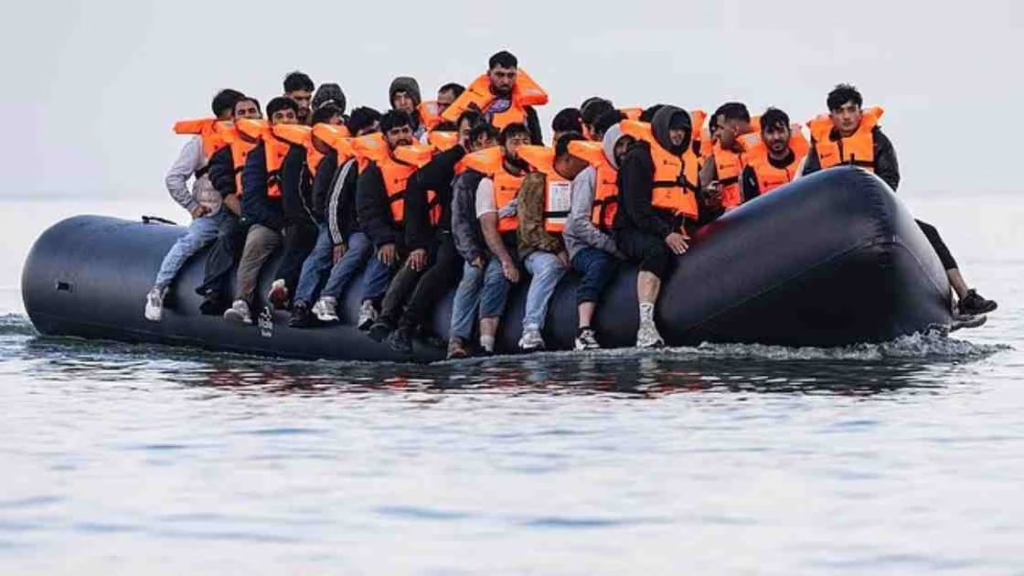A former Albanian people smuggler who operated Channel crossing routes has made explosive claims that the UK government could halt small boat arrivals immediately if it chose to do so.
The Smuggler’s Perspective
Speaking anonymously to the Daily Express, the man who earned approximately £400,000 from smuggling operations before abandoning the trade earlier this year, argued that Britain lacks the political will rather than the capability to stop the crossings.
“I don’t believe the UK lacks the means to stop this type of thing from happening,” he stated, suggesting that Labour may be allowing the crossings to continue because they provide additional workforce capacity.
The former smuggler explained that stopping the boats would be straightforward since they depart from only two or three locations along the French coast using predictable, trackable routes.

Current Scale of the Crisis
Since Labour took power in July 2024, approximately 50,000 migrants have arrived via small boats—equivalent to one person every 11 minutes. This milestone was reached seven months faster than under the previous Conservative government led by Rishi Sunak.
On August 11 alone, 474 people crossed the Channel in eight boats, highlighting the scale of ongoing arrivals.
Skepticism About Government Measures
The smuggler expressed doubt about several government initiatives:
Social Media Crackdowns: The Home Office recently announced measures to target social media promotion of illegal crossings. However, the former smuggler dismissed this approach, noting that most operators work outside British jurisdiction and regularly change identities using fake addresses and phone numbers purchased on the black market.
“Smashing the Gangs” Strategy: Prime Minister Keir Starmer’s flagship policy to dismantle smuggling networks was criticized as insufficient without multi-country cooperation.

The Human Element
Despite his criminal activities, the smuggler offered a nuanced view of migration, describing current anti-migrant protests as “laughable” because most passengers are simply “hopeless” young people seeking better lives.
“I don’t think a woman with a toddler can be considered a criminal,” he reflected, arguing that migrants are not Britain’s primary problem as many believe.
In Albania, he noted, people smuggling is viewed positively as “enabling a path of hope,” despite the inherent risks that have led to widely reported drownings.
Government Response and New Measures
The Home Office defended its approach, citing:
- A 40% increase in disruptions of organized immigration crime networks in 2024/25
- The establishment of Border Security Command
- Enhanced operational capacity for the National Crime Agency and Immigration Enforcement
- Arrests of major trafficking ringleaders across Europe
The “One In, One Out” Deal: A new arrangement with France became operational this month, allowing UK officials to refer migrants for return to France within three days of arrival, with French authorities responding within 14 days. In exchange, approved asylum seekers in France will be brought to the UK through safe routes.
Political Reactions
Labour’s Position: Education minister Baroness Jacqui Smith called the 50,000 figure “unacceptable” and blamed the previous Conservative government for allowing criminal gangs to establish a foothold in Channel trafficking.
Conservative Criticism: Party leader Kemi Badenoch dismissed Labour’s manifesto promise to “smash the criminal boat gangs” as “just a slogan,” arguing that crossings have worsened and local communities are bearing the costs of government incompetence.
The Broader Context
The former smuggler suggested that Britain’s approach has created “big gaps” that illegal migrants can exploit, particularly in undocumented employment sectors like construction where many Albanians work without proper paperwork.
Labour scrapped the previous government’s Rwanda deportation scheme as one of its first acts in office, a policy that cost an estimated £700 million but saw only a handful of voluntary departures to the central African nation.






